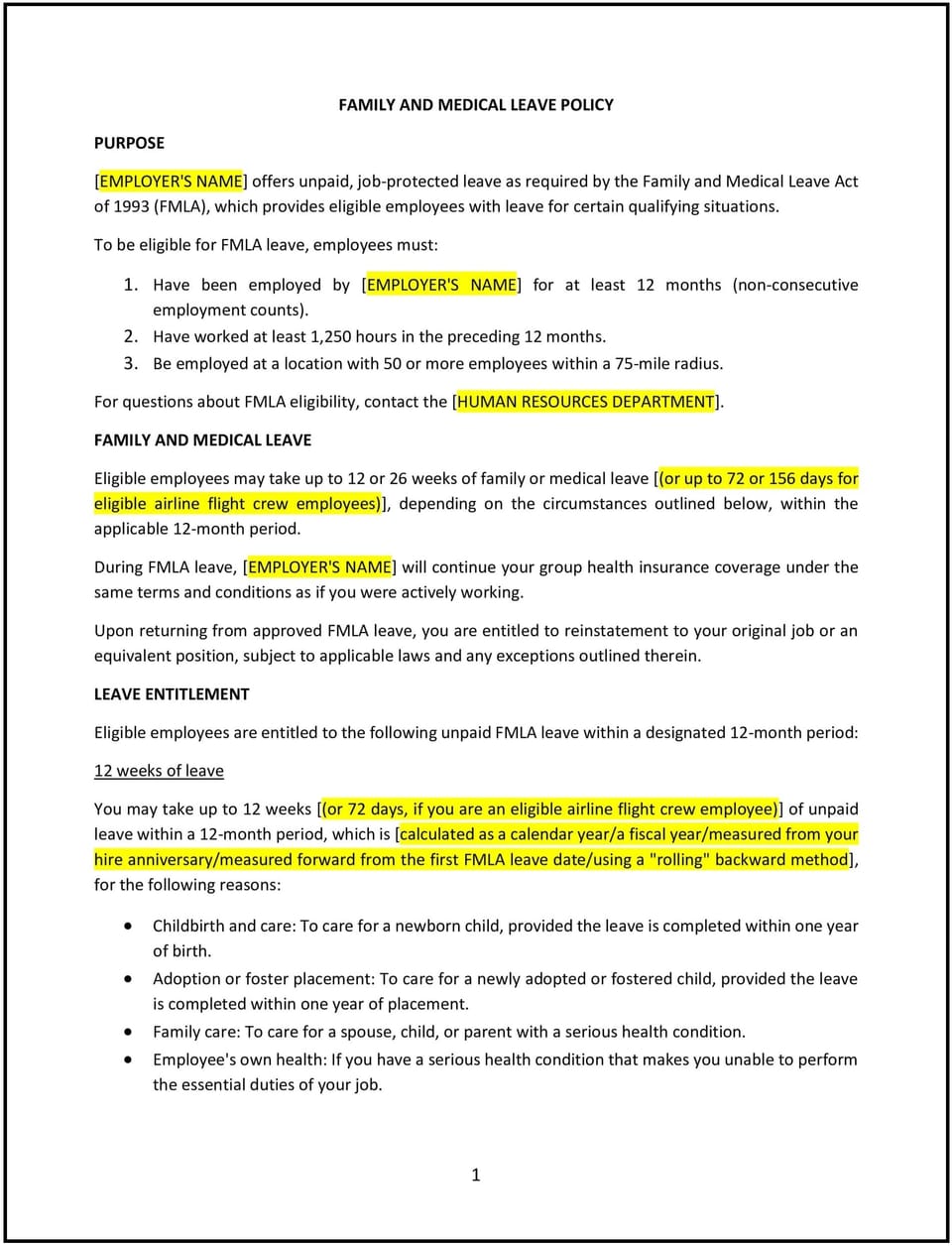Family and medical leave policy (Alaska): Free template

Family and medical leave policy (Alaska)
In Alaska, a family and medical leave policy provides employees with the opportunity to take unpaid leave for qualifying personal or family health-related reasons while protecting their job security. This policy ensures compliance with the Family and Medical Leave Act (FMLA) and other relevant regulations, promoting a supportive and equitable workplace. By implementing a clear family and medical leave policy, businesses can help employees balance work and personal responsibilities while maintaining operational continuity.
Given Alaska’s unique workforce dynamics, including remote and seasonal work environments, businesses may need to adapt their policies to address logistical and operational challenges.
How to use this family and medical leave policy (Alaska)
- Define eligibility: Specify which employees are eligible for family and medical leave, such as those who meet tenure or hours-worked requirements under FMLA.
- Outline qualifying reasons: Provide a clear list of qualifying circumstances, such as caring for a newborn, a serious health condition, or a family member with a critical illness.
- Detail the leave process: Include instructions for requesting leave, such as providing notice, submitting required documentation, and adhering to timelines.
- Address leave duration: Specify the maximum duration of leave, such as 12 weeks under FMLA, and explain any extensions or additional provisions for Alaska-specific needs.
- Communicate rights and responsibilities: Ensure employees understand their rights under the policy and any responsibilities, such as maintaining communication during leave or providing updates on their return-to-work plans.
Benefits of using a family and medical leave policy (Alaska)
A family and medical leave policy provides several advantages for businesses in Alaska. Here’s how it helps:
- Supports employee well-being: Helps employees manage personal or family health needs without fearing job loss, fostering loyalty and satisfaction.
- Ensures compliance: Helps businesses adhere to FMLA and any applicable Alaska-specific leave requirements, reducing the risk of legal issues.
- Promotes workplace equity: Provides a consistent and transparent framework for granting leave, ensuring fair treatment of all employees.
- Enhances reputation: Demonstrates a commitment to supporting employees, improving the company’s image as a caring and responsible employer.
- Reduces turnover: Helps retain employees by providing them with the support they need during challenging life events.
Tips for using a family and medical leave policy (Alaska)
- Address remote workforce needs: Include provisions for remote employees, such as digital submission of leave requests and virtual communication during the leave period.
- Monitor compliance: Regularly review leave practices to ensure they align with FMLA requirements and any applicable state laws or regulations.
- Provide manager training: Train supervisors to handle leave requests sensitively and ensure they understand their role in implementing the policy.
- Offer additional resources: Provide access to employee assistance programs (EAPs) or other support services to help employees during their leave.
- Review periodically: Update the policy as needed to reflect changes in laws, workforce dynamics, or organizational goals.
Q: Which employees are eligible for family and medical leave under this policy?
A: Employees who have worked for the company for at least 12 months and meet the hours-worked requirement, as specified under FMLA, are typically eligible.
Q: What types of situations qualify for family and medical leave?
A: Qualifying circumstances include the birth or adoption of a child, caring for a seriously ill family member, a personal serious health condition, or specific situations related to military service.
Q: How should employees request family and medical leave?
A: Employees must provide notice as soon as practicable, submit required documentation, and follow the procedures outlined in the policy.
Q: Are employees paid during family and medical leave?
A: Family and medical leave is generally unpaid under FMLA. However, employees may use accrued paid leave, such as vacation or sick time, if allowed by the company policy.
Q: How often should this policy be reviewed?
A: Review the policy annually or whenever significant changes occur in FMLA requirements, state laws, or company practices.
This article contains general legal information and does not contain legal advice. Cobrief is not a law firm or a substitute for an attorney or law firm. The law is complex and changes often. For legal advice, please ask a lawyer.


